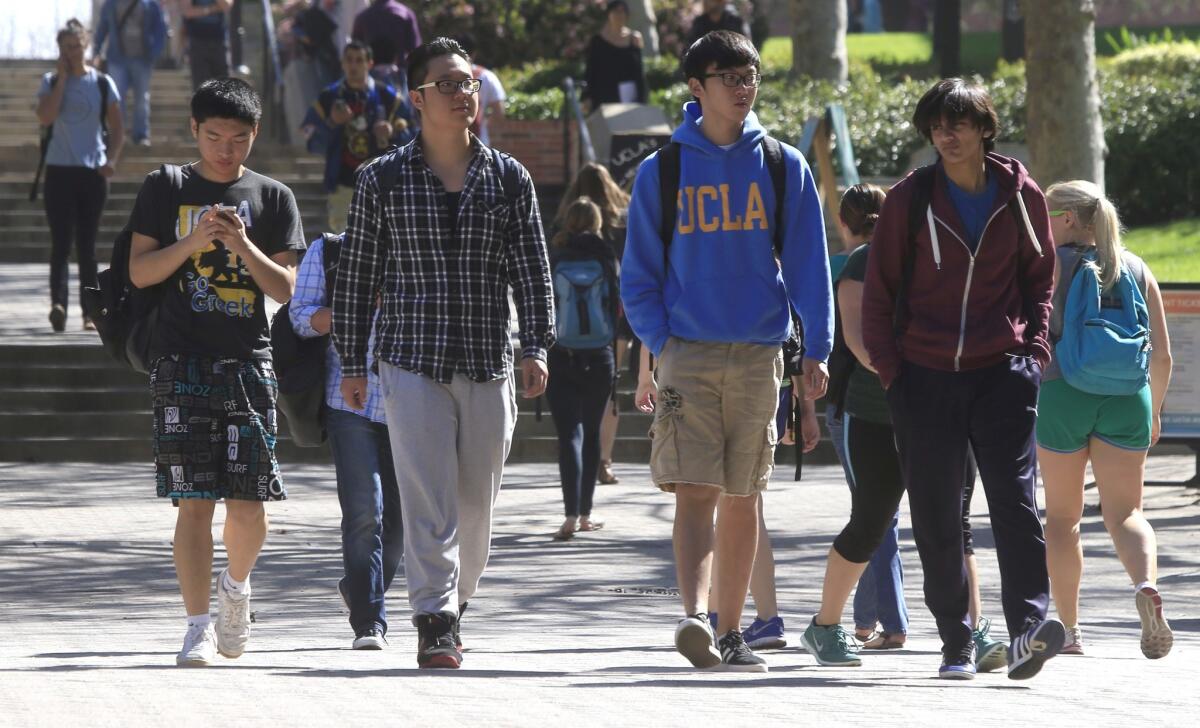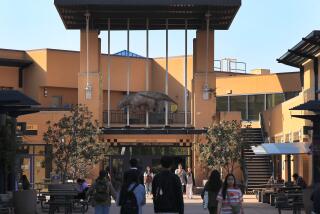Influx of Chinese students into U.S. may be tapering off

For years, soaring numbers of Chinese graduate students in the U.S. have been a boon for American universities and local economies, especially in places like Southern California.
But it looks like the influx could be slowing.
Admission offers from U.S. graduate schools to Chinese nationals, who make up one-third of all international master’s and doctoral degree students in the U.S., flattened this year after nearly a decade of rapid annual growth, according to the Council of Graduate Schools, a Washington nonprofit.
As recently as 2012, admission offers to prospective Chinese graduate students shot up by 20%.
At the same time, applications from prospective Chinese graduate students are also leveling off, dropping 1% this year, the nonprofit group said.
The council does not track information on Chinese students seeking bachelor’s degrees in the U.S., and experts and officials at universities said there were no hard data to suggest that the number of Chinese undergraduates at American schools has slowed from the double-digit annual increases seen over the last decade.
But if the Council of Graduate Schools’ admissions data prove to be on the mark, as they have in the past, then American universities could see a drop in overall foreign graduate students in the not-too-distant future because the Chinese have been driving the growth in graduate enrollment in recent years.
That could financially pinch some schools that have come to rely more on Chinese and other international students to fill their graduate programs.
Experts said one factor behind the apparent shift from China is the same force that has hurt prices of steel and other raw materials: slower growth in the world’s second-largest economy in the last two years.
“It’s not realistic to expect the Chinese numbers to rise as fast as previously,” said Dali Yang, faculty director of the University of Chicago Center in Beijing. “As growing numbers of Chinese students study abroad, the allure may have also been somewhat diminished for some students.”
A drop-off in Chinese graduate students certainly would be felt in Southern California, a major destination for foreign students, especially from Asia.
Based on F-1 visas, the most common issued to foreign students, no school has more international students than USC.
From 2008 to 2012, USC had 13,996 students on F-1 visas in bachelor’s and graduate degree programs, according to a study by Neil Ruiz, a senior policy analyst at the Brookings Institution. Columbia University and the University of Illinois were closely behind.
UCLA had 7,860 students on F-1 visas during that five-year period, making it No. 15 among American universities, and UC Berkeley was 20th with an enrollment of 7,133 international students.
For the 2013-14 academic year, USC reported a total of 8,745 international students — 42% of them from China. The Chinese enrollment was up 21% from the prior year, and USC spokesman Carl Guido Marziali said he had no indication of a leveling off in the new academic year, though data won’t be available for a few months.
Like trade officials, representatives from USC and other major American universities years ago began targeting China by establishing partnerships and centers in that country. The surging numbers of Chinese students were the fruits of those marketing efforts.
Students from China, as well as those from South Korea and increasingly India, have provided significant economic benefits to American cities.
The Los Angeles area was home to 68,271 students on F-1 visas in 2008-12, second only to the New York region, according to the Brookings report.
Total tuition revenue exceeded $1.5 billion, and living expenses for these foreign students added nearly $1.1 billion more to the local economy.
And that doesn’t include the spending of many relatives of foreign students who visit or the purchases of houses that some Chinese families make for both investments and as places for their children to live while they are studying.
Furthermore, Brookings’ Ruiz said cities such as Los Angeles have capitalized by leveraging foreign students’ contacts, knowledge and language to help local businesses grow in China and other Asian countries.
“They’re really helpful,” Ruiz said, citing Chinese MBA candidates and alumni of USC’s Marshall School of Business for their influence on Los Angeles-area companies.
“If it really is slowing down,” he said of Chinese enrollment, “it could be a concern.”







